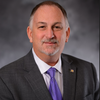Anthony Sorace
Anthony Sorace (Democratic Party, Independent Party, Working Families Party) ran for election to the Oregon House of Representatives to represent District 31. He lost in the general election on November 8, 2022. He advanced from the Democratic primary on May 17, 2022.
Sorace completed Ballotpedia's Candidate Connection survey in 2022. Click here to read the survey answers.
Biography
Sorace attended Rutgers University. Sorace's career experience includes working in engineering and engineering management.[1]
Elections
2022
See also: Oregon House of Representatives elections, 2022
General election
General election for Oregon House of Representatives District 31
Brian Stout defeated Anthony Sorace in the general election for Oregon House of Representatives District 31 on November 8, 2022.
Candidate | % | Votes | ||
| ✔ |  | Brian Stout (R) | 59.3 | 22,026 |
 | Anthony Sorace (D / Independent Party / Working Families Party)  | 40.5 | 15,031 | |
| Other/Write-in votes | 0.2 | 77 | ||
| Total votes: 37,134 | ||||
 = candidate completed the Ballotpedia Candidate Connection survey. = candidate completed the Ballotpedia Candidate Connection survey. | ||||
| If you are a candidate and would like to tell readers and voters more about why they should vote for you, complete the Ballotpedia Candidate Connection Survey. | ||||
Do you want a spreadsheet of this type of data? Contact our sales team. | ||||
Democratic primary election
Democratic primary for Oregon House of Representatives District 31
Anthony Sorace advanced from the Democratic primary for Oregon House of Representatives District 31 on May 17, 2022.
Candidate | % | Votes | ||
| ✔ |  | Anthony Sorace  | 97.7 | 5,312 |
| Other/Write-in votes | 2.3 | 125 | ||
| Total votes: 5,437 | ||||
 = candidate completed the Ballotpedia Candidate Connection survey. = candidate completed the Ballotpedia Candidate Connection survey. | ||||
| If you are a candidate and would like to tell readers and voters more about why they should vote for you, complete the Ballotpedia Candidate Connection Survey. | ||||
Do you want a spreadsheet of this type of data? Contact our sales team. | ||||
Republican primary election
Republican primary for Oregon House of Representatives District 31
Brian Stout defeated Drew Layda in the Republican primary for Oregon House of Representatives District 31 on May 17, 2022.
Candidate | % | Votes | ||
| ✔ |  | Brian Stout | 63.3 | 4,756 |
 | Drew Layda | 36.2 | 2,720 | |
| Other/Write-in votes | 0.5 | 36 | ||
| Total votes: 7,512 | ||||
 = candidate completed the Ballotpedia Candidate Connection survey. = candidate completed the Ballotpedia Candidate Connection survey. | ||||
| If you are a candidate and would like to tell readers and voters more about why they should vote for you, complete the Ballotpedia Candidate Connection Survey. | ||||
Do you want a spreadsheet of this type of data? Contact our sales team. | ||||
Endorsements
To view Sorace's endorsements in the 2022 election, please click here.
Campaign themes
2022
Ballotpedia survey responses
See also: Ballotpedia's Candidate Connection
Anthony Sorace completed Ballotpedia's Candidate Connection survey in 2022. The survey questions appear in bold and are followed by Sorace's responses.
| Collapse all
My professional background is mostly in engineering and engineering management. My most important skill there is my ability to look at large, complex problems and break them down into smaller pieces that we can actually make progress on. This same skill is invaluable when we look at some of our more challenging social problems, from affordable housing to access to mental health care. My professional background, with experience from working at 5-person startups to being a director at a multinational technology company, also gives me a good understanding of what it takes to attract the next generation of good jobs to our region.
I also have a long history of working with youth, from running technical mentorship programs to two decades of youth ministry. It's given me a very clear understanding of where our future lies, the importance of listening with real empathy to people's stories and struggles, and how to best help our young people succeed.
I look forward to bringing all of this to public service.- The most pressing problems in our region — access to affordable housing, addressing the gaps in our healthcare system, and ensuring our education system meets the needs of our children — are complex, but they are not bigger than our ability. We have the tools to make progress on each of these, if we address them seriously. I've been doing that today and will continue to do so.
- I'll always show up for my community. This has been true during my campaign, where I've been at every community event I could and worn out my shoes going door-to-door to talk with our neighbors, and that commitment will continue during my term as your Representative.
- We need to make sure our elected officials put the needs of our people first, not the desires of a particular political group or financial backers. I have a long history of working on the issues facing us independent of any political party, and have been working on our current issues across party lines today. I'll continue to put the needs of our people above all other considerations.
Healthcare, especially mental health, addiction services, and access to primary care. Oregon has a mental health crisis, ranking 46th in the nation for access to care, and this situation gets worse for many communities; youth in rural communities, like ours, are particularly vulnerable. We must do better. This, combined with a shortage of services for people struggling with addiction and access to primary care, are my main focuses for improving our healthcare system.
1) Crafting, reviewing, and adjusting legislation, regulation, and related activities.
2) Talking with constituents about their hopes, needs, and difficulties.
3) Helping constituents with direct service when interacting with our government.
More fundamentally: we have to address the growing inequality in our state — from access to services to the concentration of more and more wealth in fewer and fewer hands — and we must continue to fight against anti-democratic forces who're willing to sacrifice the fundamental principles of our society to enforce minority rule.
The main benefit of a unicameral legislature is simplicity in citizens understanding and interacting with their government.
There are, however, a different set of issues that come up in government, and those are a different story. When it comes to defending the rights of all people, compromise is not a good solution. When faced with the choice between protecting someone's rights or not protecting those rights, there is a clearly correct answer.
Note: Ballotpedia reserves the right to edit Candidate Connection survey responses. Any edits made by Ballotpedia will be clearly marked with [brackets] for the public. If the candidate disagrees with an edit, he or she may request the full removal of the survey response from Ballotpedia.org. Ballotpedia does not edit or correct typographical errors unless the candidate's campaign requests it.
See also
2022 Elections
External links
|
Candidate Oregon House of Representatives District 31 |
Personal |
Footnotes
- ↑ Information submitted to Ballotpedia through the Candidate Connection survey on October 9, 2022








